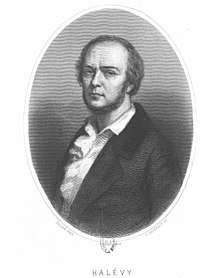Le Juif errant (opera)
Le Juif errant (The Wandering Jew) is a grand opera by Fromental Halévy, with a libretto by Eugène Scribe and Jules-Henri Vernoy de Saint-Georges.
| Fromental Halévy |
|---|
 |
|
Operas
|
The opera is based extremely loosely on themes of the novel Le Juif errant, by Eugène Sue. Whilst the novel is set in 19th century Paris and the Wandering Jew is incidental to the main story-line, the opera begins in Amsterdam in 1190 and the Jew Ahasuerus (spelled Ashvérus[1] in the opera) is a leading character.
Performance history
Le Juif errant was premiered at the Salle Le Peletier of the Paris Opera on 23 April 1852, and had 48 further performances over two seasons. The music was sufficiently popular to generate a Wandering Jew Mazurka, a Wandering Jew Waltz, a Wandering Jew Polka[2] and in France just in the several months after the opera was premiered an even more considerable quantity of piano works, including several called "Grande fantaisie dramatique" and similar titles, based on the opera.[3]
Roles
.jpg)
| Role | Voice type | Premiere cast,[4] 23 April 1852 (Conductor: Narcisse Girard) |
|---|---|---|
| Ashvérus, the Wandering Jew | baritone | Eugène Massol |
| Nicéphore, Emperor of the Orient | bass | Louis-Henri Obin |
| Léon, descendant of Ashvérus | tenor | Gustave-Hippolyte Roger |
| Théodora, boatwoman of the Scheldt, sister of Léon | mezzo-soprano | Fortunata Tedesco |
| Irène, daughter of Baudoin, Count of Flanders, also a descendant of Ashvérus | soprano | Emma La Grua[5] |
| Lady of honor | soprano | Petit-Brière |
| The exterminating angel | tenor | Chapuis |
| Ludgers, bandit chief | bass | Depassio |
| Manoel, first bandit | bass | Canaple |
| Andronic, second bandit | bass | Guigneau[6] |
| Jean, third bandit | bass | Noir |
| Arbas, fourth bandit | bass | Goyon |
| Night watchman | baritone | Merly |
| An officer of the palace | baritone | Lyon |
| A lord | baritone | Molinier |
| Another lord | tenor | Donzel |
| Chorus: lords, ladies, and people of Antwerp; robbers and bad boys; shopkeepers, inhabitants of Brabant; lords and ladies of Emperor Nicéphore's court; people of Thessalonica; people of Constantinople; mutes, almées (harem entertainers), slaves; Emperor's guards; Empress Irène's lady; angel, demons, the chosen, the damned, etc. | ||
References
Notes
- Sue's spelling of the name was 'Ahasvérus', a version also used by Edgar Quinet. However, Scribe's version of the name can be found in earlier literature (e.g. in 1834)
- Anderson, (1991), p. 259.
- "Bibliographie de la France (1852): bibliographie". Retrieved 22 September 2014.
- Cast list based on the 1852 libretto published by Brandus, and Tamvaco (2000), vol. 2, pp. 882–883 (and the index for full names).
- The libretto and Gourret (1987), p. 41, write this singer's name as Lagrua. Karl-Josef Kutsch & Leo Riemens (2003), vol. 4, p. 2577–2578, have an extensive article on her and give the name as Emma (Emmy, Emilia) La Grua, née Emmy Funk. Referred to in Meyerbeeer (1999) passim as 'Lagrua' (see p. 879 for short note) and Meyerbeer (2004), p. 741, as Emilie Carini (also Emmy la Grua). Tamvaco (2000), p. 883, gives the name Emmy La Grua.
- Gourret (1982), p. 69, lists a baritone by the name of Guignot, who first appeared at the Paris Opera ca. 1848.
Sources
- Anderson, George Kumler (1991). The Legend of the Wandering Jew. Hanover, NH: Brown University Press. ISBN 9780874515473.
- Gourret, Jean (1982). Dictionnaire des chanteurs de l'Opéra de Paris. Paris: Albatros. View formats and editions at WorldCat.
- Gourret, Jean (1987). Dictionnaire des cantatrices de l'Opéra de Paris. Paris: Albatros. ISBN 9782727301646.
- Jordan, Ruth (1994). Fromental Halévy: His Life & Music, 1799–1862. London: Kahn & Averill. ISBN 9781871082517.
- Kutsch, K. J.; Riemens, Leo (2003). Großes Sängerlexikon (fourth edition, in German). Munich: K. G. Saur. ISBN 9783598115981.
- Macdonald, Hugh (2001). "Halévy, (Jacques-François-)Fromental(- Elie) [Fromentin(-Elias)]" in The New Grove Dictionary of Music and Musicians, 2nd edition, edited by Stanley Sadie. London: Macmillan. ISBN 9781561592395 (hardcover). OCLC 419285866 (eBook).
- Meyerbeer, Giacomo, ed. S. Henze-Döhring, (1999) Briefwechsel und Tagebücher: Band 5; 1849–1852. Berlin: De Gruyter. ISBN 3 11 014244 9
- Meyerbeer, Giacomo, ed. S. Henze-Döhring, (2004) Briefwechsel und Tagebücher: Band 7; 1856–1859. Berlin: De Gruyter. ISBN 978-3-11-018030-5
- Scribe, Eugène; Saint-Georges, Henri de (1852). Le Juif errant, opéra en 5 actes (libretto). Paris: Brandus. View at Gallica.
- Scribe, Eugène (1858). Le Juif errant in Oeuvres complètes de M. Eugène Scribe, new edition, volume XVII, pp. 149–164. Paris: Adolphe Delahays. View at Google Books.
- Tamvaco, Jean-Louis (2000). Les Cancans de l'Opéra. Chroniques de l'Académie Royale de Musique et du théâtre, à Paris sous les deux restorations (2 volumes, in French). Paris: CNRS Editions. ISBN 9782271056856.
External links
![]()